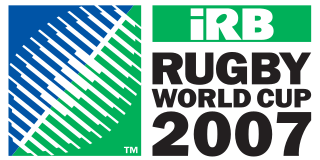
The Rugby World Cup is a men's rugby union tournament contested every four years between the top international teams. The tournament is administered by World Rugby, the sport's international governing body. The winners are awarded the Webb Ellis Cup, named after William Webb Ellis, who according to a popular legend, invented rugby by picking up the ball during a football game.

World Rugby is the world governing body for the sport of rugby union. World Rugby organises the Rugby World Cup every four years, the sport's most recognised and most profitable competition. It also organises a number of other international rugby competitions, such as the World Rugby Sevens Series, the Rugby World Cup Sevens, the World Under 20 Championship, and the Pacific Nations Cup.

The 2007 Rugby World Cup was the sixth Rugby World Cup, a quadrennial international rugby union competition inaugurated in 1987. Twenty nations competed for the Webb Ellis Cup in the tournament, which was hosted by France from 7 September to 20 October. France won the hosting rights in 2003, beating a bid from England. The competition consisted of 48 matches over 44 days; 42 matches were played in ten cities throughout France, as well as four in Cardiff, Wales, and two in Edinburgh, Scotland.

Rugby sevens is a variant of rugby union in which teams are made up of seven players playing seven-minute halves, instead of the usual 15 players playing 40-minute halves. Rugby sevens is administered by World Rugby, the body responsible for rugby union worldwide. The game is popular at all levels, with amateur and club tournaments generally held in the summer months. Sevens is one of the most well distributed forms of rugby, and is popular in parts of Africa, Asia, Europe, and the Americas, and especially in the South Pacific.
The Churchill Cup was an annual rugby union tournament, held in June, contested by representative men's teams from Canada, England, the United States, and other invited teams from a wide array of countries.

The 1991 Rugby World Cup was the second edition of the Rugby World Cup, and was jointly hosted by England, Scotland, Wales, Ireland and France: at the time, the five European countries who participated in the Five Nations Championship. This was the first Rugby World Cup to be staged in the northern hemisphere, with England the hosts of the final. Also for the first time, qualifying competitions were introduced as the number of entrants had increased from 16 nations four years before to a total of 33 countries. The eight quarter-finalists from 1987 qualified automatically with the remaining eight spots contested through qualifiers by 25 countries. This resulted in only one new side qualifying for the tournament, Western Samoa replacing Tonga. The same 16-team pool/knock-out format was used with just minor changes to the points system. South Africa was again not included because of sanctions imposed on the country by the IRB, due to the government's apartheid policies.

The 2011 Rugby World Cup was the seventh Rugby World Cup, a quadrennial international rugby union competition inaugurated in 1987. The International Rugby Board (IRB) selected New Zealand as the host country in preference to Japan and South Africa at a meeting in Dublin on 17 November 2005. The tournament was won by New Zealand, who defeated France 8–7 in the final. The defending champions, South Africa, were eliminated by Australia 11–9 in the quarter-finals. The result marked the third time that the tournament was won by the country that hosted the event.
The first Rugby Union World Cup was held in 1987, hosted by Australia and New Zealand who pushed for the tournament to be approved. Since the first tournament, 8 others have been held at four-year intervals.
The Rugby World Cup host nation is selected by World Rugby at a meeting six years before each tournament. Each of the Rugby World Cups from 1987 to 2015 were hosted by countries that are considered the traditional powers in World Rugby. The first non Rugby Championship or Six Nations country to host a Rugby World Cup was Japan in 2019, after failed bids for the 2011 and 2015 tournaments.
The 2010 Women's Rugby World Cup was the sixth edition of the Women's Rugby World Cup and was held in England. The International Rugby Board Executive Committee selected the host union following a recommendation from the Rugby World Cup Limited board after considering bids from the Rugby Football Union and the German Rugby Union – it had been England's third successive bid after being rejected in 2002 and 2006. The tournament was again being organised by the International Rugby Board (IRB) as opposed to the host union, and included five matches for all teams played on 20, 24, 28 August and 1 and 5 September. In May 2009 it was announced that the semi final, 3rd place play off and final would take place at The Stoop and not Twickenham as had previously been suggested. Pool games were held at the Surrey Sports Park in Guildford.

The International Rugby Board (IRB) awarded the 2007 Under 19 Rugby World Championship to the Irish Rugby Football Union (IRFU) and the Ulster branch hosted it. The Tournament, which took place in Belfast, Northern Ireland from 4–21 April, was split into two divisions of twelve teams. Division A games took place in Belfast at Belfast Harlequins' Deramore Park, Ulster Rugby's Ravenhill Stadium, and Cooke RFC/Instonians' Shaw's Bridge complex. Division B games were held in Queen's University of Belfast's The Dub complex and Malone RFC's Gibson Park in Belfast, and Bangor RFC's Upritchard Park in Bangor.

The Rugby League World Cup is an international rugby league tournament contested by the top national men's representative teams. The tournament is administered by the International Rugby League and was first held in France in 1954, which was the first World Cup held for any form of rugby football.

Women's rugby union is a full contact team sport based on running with the ball in hand. The same laws are used in men's rugby union with the same sized pitch and same equipment. Rugby was originally a men's sport, and women's rugby has become popular only more recently. These days, women's rugby is gaining a higher profile thanks to international tournaments' exposure and financial investment.

The Rugby World Cup is a rugby union tournament held every four years and contested by the men's national teams of the member unions of World Rugby. The Wales national rugby union team has participated in all nine Rugby World Cup tournaments. Up to and including 2015, hosting of the tournament alternated between traditional rugby heartlands in the southern hemisphere and those in Europe. Wales was the primary host in 1999, with Cardiff's Millennium Stadium built to coincide with the event, and the other three tournaments played in Europe have also used venues in Wales to some degree. Cardiff's Millennium Stadium and its predecessor, the Cardiff Arms Park, will have hosted a total 21 matches over a total of four World Cups. This is the largest number of World Cup games hosted by one venue.

The England Under 20 rugby team are the newest representative rugby union team from England. They replace the two former age grade teams Under 19s and Under 21s. They compete in the annual Six Nations Under 20s Championship and World Rugby Under 20 Championship.

The 2014 Women's Rugby World Cup was the seventh edition of the Women's Rugby World Cup, and the sixth held in Europe. The World Cup Final took place on 17 August.

The 2018 Rugby World Cup Sevens was the seventh edition of the Rugby World Cup Sevens. Organised by World Rugby, it was held at AT&T Park, now known as Oracle Park, in San Francisco, United States. A total of 84 matches were played over three days from July 20–22, 2018. The men’s tournament had 24 teams and the women’s tournament 16, with both tournaments being played for the first time in a knock-out only format. New Zealand won the championship for both events — defeating England in the men's final and France in the women's final.

The 2021 Rugby World Cup was the ninth staging of the women's Rugby World Cup, as organised by World Rugby. It was held from 8 October to 12 November 2022 in Auckland and Whangārei, New Zealand. It was originally scheduled to be held in 2021, but was postponed by one year due to the COVID-19 pandemic.
The qualification process for the 2010 Women's Rugby World Cup began on 6 February 2009. A total of 12 teams qualified for the tournament, which was held in England between 20 August – 5 September 2010.

The 2021 Rugby League World Cup (RLWC2021) was a collection of world cups in the sport of rugby league, held in England from 15 October to 19 November 2022. England won hosting rights for the competition on 27 October 2016. The bid received £25 million UK government support, partnered with the UK Cabinet Office as part of a commitment to the Northern Powerhouse, with 87 percent of all matches to be held in northern towns and cities. Organisers initially planned for the tournaments to go ahead between 23 October and 27 November 2021 despite the COVID–19 pandemic but withdrawals from Australia and New Zealand over "player welfare and safety concerns" caused the tournaments to be postponed – with the event's chief executive admitting that a World Cup without those teams would have lacked credibility.


















